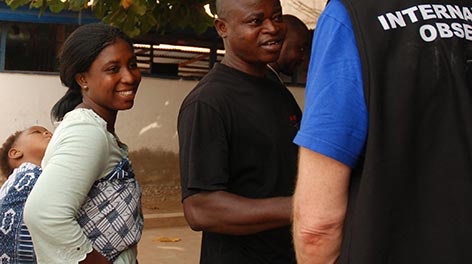 As the sun rose on Ghana's second election day in two weeks, Alice Appoh had already stood in line for hours to wait for voting to begin, her two-year-old child sound asleep on her back.
Learn more »
As the sun rose on Ghana's second election day in two weeks, Alice Appoh had already stood in line for hours to wait for voting to begin, her two-year-old child sound asleep on her back.
Learn more »
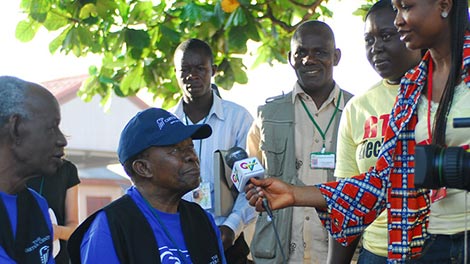 More than 50 Carter Center observers witnessed Ghana's Dec. 7 elections, the results of which will determine the country's next president and parliament.
Learn more »
More than 50 Carter Center observers witnessed Ghana's Dec. 7 elections, the results of which will determine the country's next president and parliament.
Learn more »
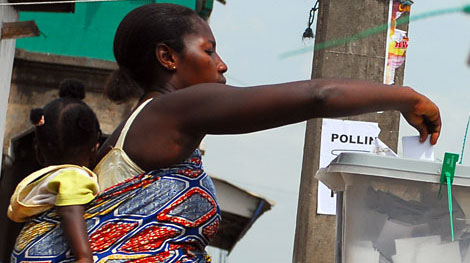 Fifty–seven Carter Center observers witnessed Ghana's Dec. 7, 2008, presidential and parliamentary elections. Overall, the Center’s observers visited more than 300 polling stations on election day, witnessing the opening, voting, and closing of voting across the country.
Learn more »
Fifty–seven Carter Center observers witnessed Ghana's Dec. 7, 2008, presidential and parliamentary elections. Overall, the Center’s observers visited more than 300 polling stations on election day, witnessing the opening, voting, and closing of voting across the country.
Learn more »
 A Chinese delegation hosted by The Carter Center is studying today's U.S. election in the San Francisco and Washington, D.C., areas to learn more about election procedures and reduce misperceptions by the Chinese of the American democratic system.
Learn more »
A Chinese delegation hosted by The Carter Center is studying today's U.S. election in the San Francisco and Washington, D.C., areas to learn more about election procedures and reduce misperceptions by the Chinese of the American democratic system.
Learn more »
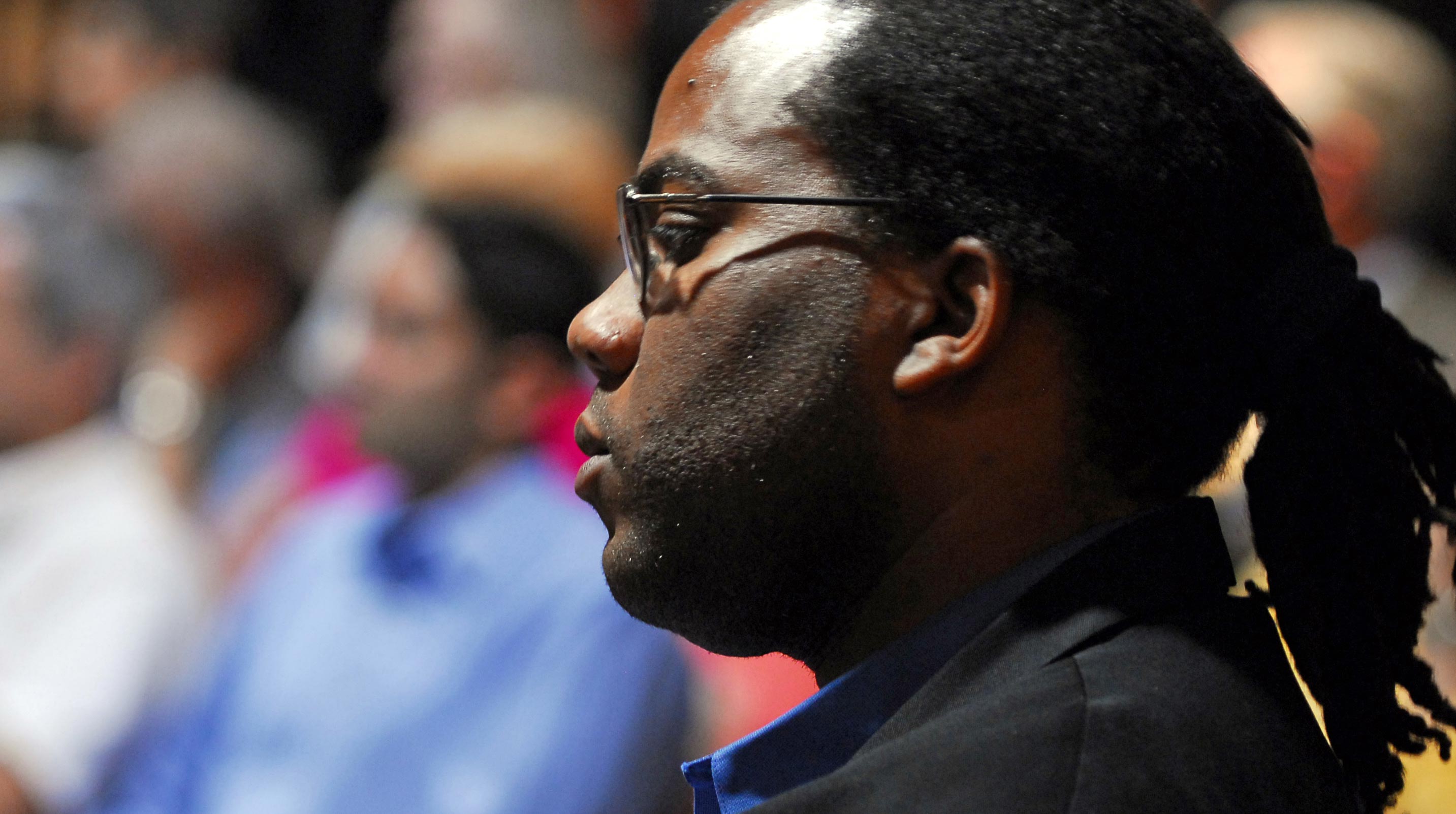 In a refugee camp in the Democratic Republic of the Congo, journalist Jimmie Briggs listens via translator to a young woman describe being raped by soldiers. Briggs, an unlikely confidant as both a man and an American, is so devastated by her account he cannot continue taking notes. He begins to weep and offers to end the interview. The woman, "Madeline," refuses.
Learn more »
In a refugee camp in the Democratic Republic of the Congo, journalist Jimmie Briggs listens via translator to a young woman describe being raped by soldiers. Briggs, an unlikely confidant as both a man and an American, is so devastated by her account he cannot continue taking notes. He begins to weep and offers to end the interview. The woman, "Madeline," refuses.
Learn more »
Hrair Balian, director, Conflict Resolution Program, joined The Carter Center in 2008. Balian oversees the program’s efforts to monitor conflicts around the world and coordinates the Center’s cross-program efforts in the Middle East. He is also an adjunct professor at the Emory University Law School, teaching an advanced international negotiations seminar. Learn more »
The Carter Center Conflict Resolution Program works to prevent and resolve deadly conflicts by monitoring early warnings in fragile states and through timely, targeted, and impartial interventions. When possible and appropriate, rapid-response interventions--negotiations, mediations, or facilitation--are accomplished through the personal involvement of President and Mrs. Carter, with the support of program staff. In other instances, senior staff conduct interventions with support from senior diplomats around the world. We also engage in sustained post-conflict peacebuilding to promote reconciliation and the restoration of the rule of law. Additionally, the program targets challenging contemporary issues of international peace and security not addressed by other institutions. Learn more »
In light of the recent passage of the Paul Wellstone and Pete Domenici Mental Health Parity and Addiction Equity Act of 2008, Mrs. Carter sat down to discuss what has changed since she began her advocacy work and what still can be done for people living with mental illnesses. Learn more »
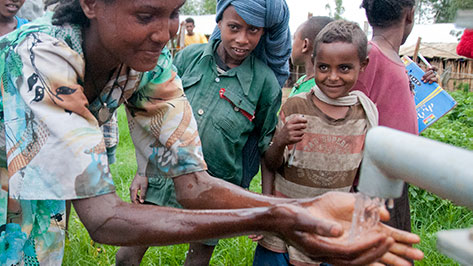 Conventional wisdom says trachoma — the leading cause of preventable blindness worldwide — can only be treated, not eliminated. But Teshome Gebre, The Carter Center's point man for trachoma control in Ethiopia, hopes to defy that wisdom. He is convinced that trachoma's blinding and debilitating effects can be stopped before the end of the next decade, the targeted goal for global trachoma elimination.
Learn more »
Conventional wisdom says trachoma — the leading cause of preventable blindness worldwide — can only be treated, not eliminated. But Teshome Gebre, The Carter Center's point man for trachoma control in Ethiopia, hopes to defy that wisdom. He is convinced that trachoma's blinding and debilitating effects can be stopped before the end of the next decade, the targeted goal for global trachoma elimination.
Learn more »
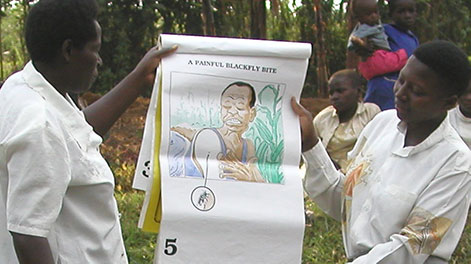 River blindness is such a pervasive disease in Africa that many global experts believe it can only be controlled not eliminated. But Uganda has announced plans to rid the disease, despite hefty challenges. The country's Ministry of Health officials believe that eliminating the disease will be more cost-effective than continuing control efforts indefinitely for its estimated 2 million citizens at risk.
Learn more »
River blindness is such a pervasive disease in Africa that many global experts believe it can only be controlled not eliminated. But Uganda has announced plans to rid the disease, despite hefty challenges. The country's Ministry of Health officials believe that eliminating the disease will be more cost-effective than continuing control efforts indefinitely for its estimated 2 million citizens at risk.
Learn more »
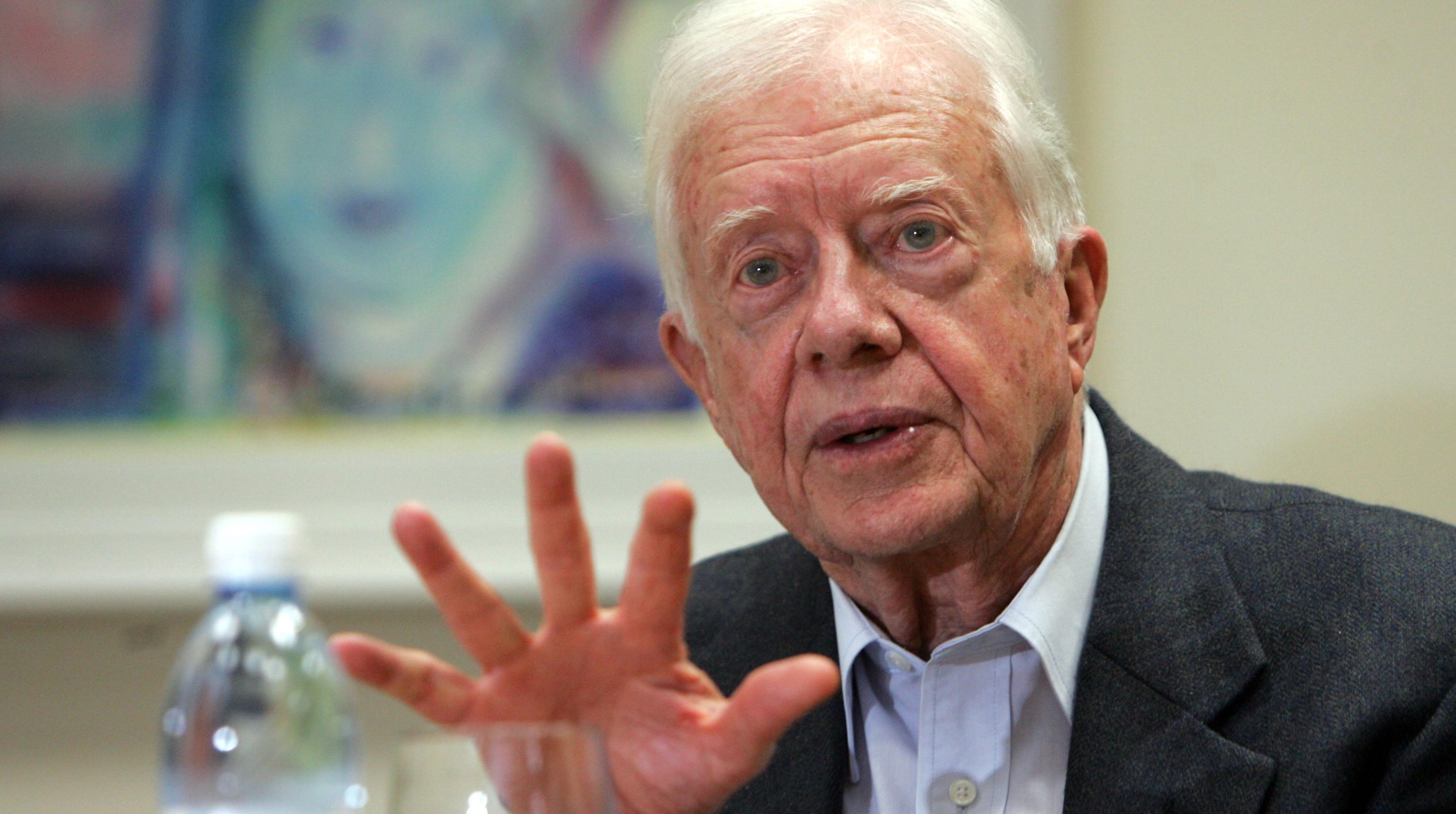 Former U.S. President Jimmy Carter led a mission to Israel, the West Bank, Egypt, Syria, Saudi Arabia, and Jordan April 13-21, 2008, as part of the Carter Center's ongoing effort to support peace, democracy, and human rights in the region. Accompanying him were former First Lady Rosalynn Carter; son Jeffrey Carter; former U.S. Congressman Stephen Solarz; Dr. Robert Pastor, senior Carter Center advisor; and Hrair Balian, director of the Center's Conflict Resolution Program.
Learn more »
Former U.S. President Jimmy Carter led a mission to Israel, the West Bank, Egypt, Syria, Saudi Arabia, and Jordan April 13-21, 2008, as part of the Carter Center's ongoing effort to support peace, democracy, and human rights in the region. Accompanying him were former First Lady Rosalynn Carter; son Jeffrey Carter; former U.S. Congressman Stephen Solarz; Dr. Robert Pastor, senior Carter Center advisor; and Hrair Balian, director of the Center's Conflict Resolution Program.
Learn more »
With help from the Rosalynn Carter Fellowships for Mental Health Journalism, journalists on four continents are working to reduce stigma and raise awareness about mental health and mental illnesses in their communities. Learn more »
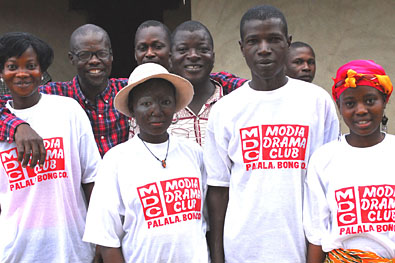 Involved with Liberia since 1991, when invited by West Aftican leaders during the country's first civil war to assist in the peace process, The Carter Center works to strengthen the rule of law.
Learn more »
Involved with Liberia since 1991, when invited by West Aftican leaders during the country's first civil war to assist in the peace process, The Carter Center works to strengthen the rule of law.
Learn more »
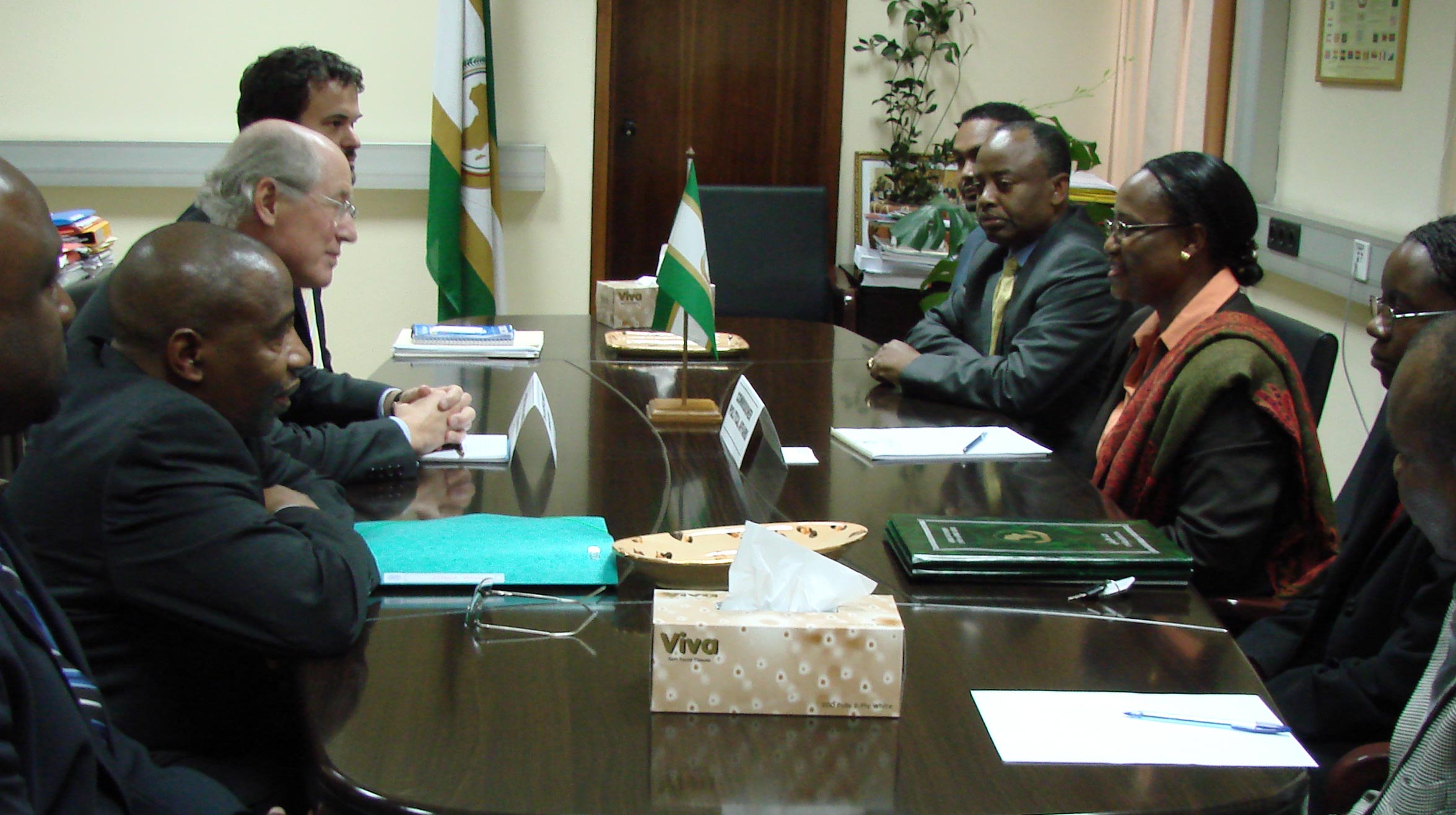 The Carter Center and the African Union (AU) signed a Memorandum of Understanding (MOU) on July 29, 2008, at the AU Commission in Addis Ababa, Ethiopia. The MOU will enable the Center to work closely with the AU in areas such as election monitoring, human rights, and strengthening democracies. Carter Center Vice-President for Peace Programs John Stremlau signed on behalf of The Carter Center while Department of Political Affairs Commissioner Julie Joiner signed on behalf of AU Commission Chairperson H.E. Jean Ping.
Learn more »
The Carter Center and the African Union (AU) signed a Memorandum of Understanding (MOU) on July 29, 2008, at the AU Commission in Addis Ababa, Ethiopia. The MOU will enable the Center to work closely with the AU in areas such as election monitoring, human rights, and strengthening democracies. Carter Center Vice-President for Peace Programs John Stremlau signed on behalf of The Carter Center while Department of Political Affairs Commissioner Julie Joiner signed on behalf of AU Commission Chairperson H.E. Jean Ping.
Learn more »
The Carter Center works toward the collective protection and promotion of meaningful democracy in the Western Hemisphere. The Center strives to enhance the quality of democracy and its ability to improve the lives of individuals in three areas: Learn more »
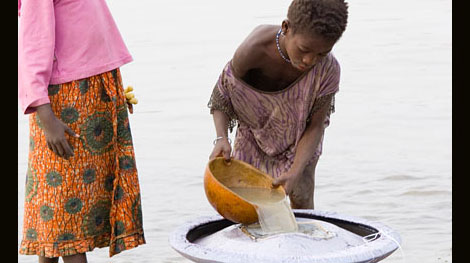 In 2007, Sadia Mesuna—a young girl from Savelugu town in Northern Ghana—spent two agonizing months in a Carter Center Guinea worm containment center with 20 other children suffering from the disease. Today, Sadia, 7, is Guinea worm-free and has returned to school. This is her story of triumph and a new life without fear.
Learn more »
In 2007, Sadia Mesuna—a young girl from Savelugu town in Northern Ghana—spent two agonizing months in a Carter Center Guinea worm containment center with 20 other children suffering from the disease. Today, Sadia, 7, is Guinea worm-free and has returned to school. This is her story of triumph and a new life without fear.
Learn more »
 In 2007, Sadia Mesuna—a young girl from Savelugu town in Northern Ghana—spent two agonizing months in a Carter Center Guinea worm containment center with 20 other children suffering from the disease. Today, Sadia, 7, is Guinea worm-free and has returned to school. This is her story of triumph and a new life without fear.
Learn more »
In 2007, Sadia Mesuna—a young girl from Savelugu town in Northern Ghana—spent two agonizing months in a Carter Center Guinea worm containment center with 20 other children suffering from the disease. Today, Sadia, 7, is Guinea worm-free and has returned to school. This is her story of triumph and a new life without fear.
Learn more »
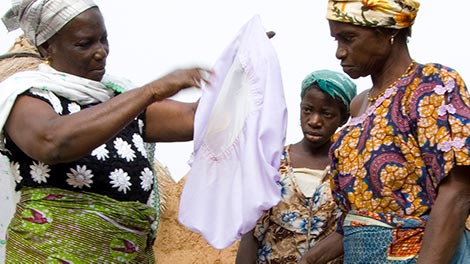 The countdown to complete elimination of Guinea worm disease is ticking closer to zero. Ethiopia, Cote d'Ivoire, Burkina Faso and Togo now have joined the list of countries reporting an end to transmission of the disease. The Carter Center leads the international coalition fighting the disease.
Learn more »
The countdown to complete elimination of Guinea worm disease is ticking closer to zero. Ethiopia, Cote d'Ivoire, Burkina Faso and Togo now have joined the list of countries reporting an end to transmission of the disease. The Carter Center leads the international coalition fighting the disease.
Learn more »
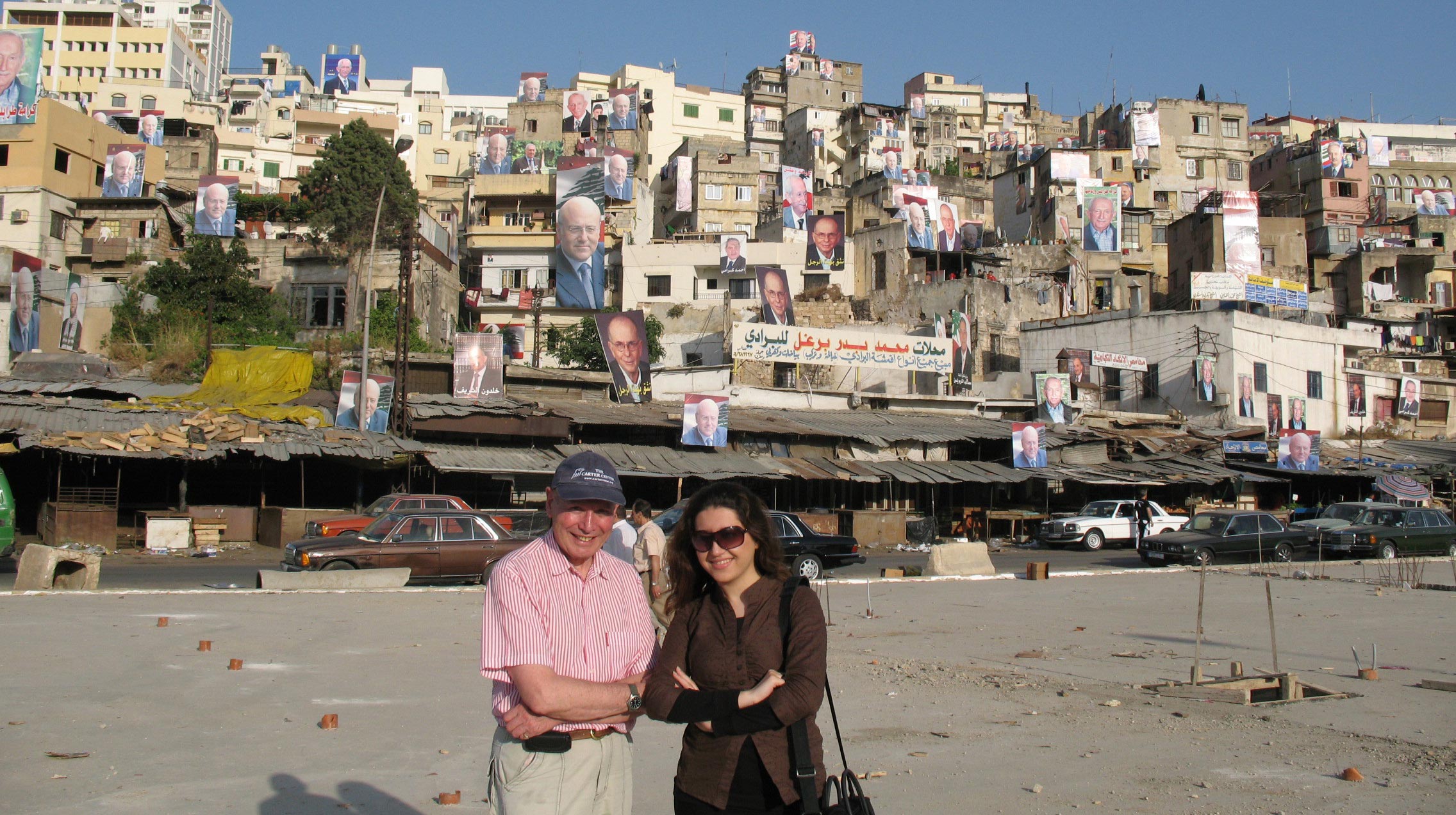 Roger Bryant is a long-term observer in the Carter Center's election observation mission in Lebanon. After a career in the British Navy, Roger worked with the Organization for Security and Co-operation in Europe (OSCE) mission to Bosnia-Herzegovina for a number of years before becoming involved in election work abroad as administrator and then as a long-term observer. Roger was a member of the Carter Center's observation mission to Nepal in 2007-8.
Learn more »
Roger Bryant is a long-term observer in the Carter Center's election observation mission in Lebanon. After a career in the British Navy, Roger worked with the Organization for Security and Co-operation in Europe (OSCE) mission to Bosnia-Herzegovina for a number of years before becoming involved in election work abroad as administrator and then as a long-term observer. Roger was a member of the Carter Center's observation mission to Nepal in 2007-8.
Learn more »
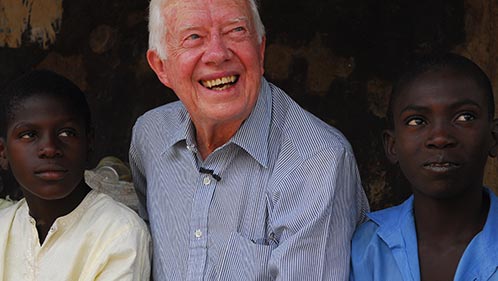 The characteristics of childhood friendship are similar all over the world. In the community of Nasarawa North in Nigeria in 2006, friends 13-year-old Aminu Farouk, 12-year-old Dauda Usman, and 11-year-old Salihu Abdullahi walk to school together, dive in the local reservoir on hot afternoons, and help each other with difficult homework assignments. They also share a deep secret. Each suffers from urinary schistosomiasis, a silent and destructive parasitic infection that leads to poor growth and impaired cognitive function in children.
Learn more »
The characteristics of childhood friendship are similar all over the world. In the community of Nasarawa North in Nigeria in 2006, friends 13-year-old Aminu Farouk, 12-year-old Dauda Usman, and 11-year-old Salihu Abdullahi walk to school together, dive in the local reservoir on hot afternoons, and help each other with difficult homework assignments. They also share a deep secret. Each suffers from urinary schistosomiasis, a silent and destructive parasitic infection that leads to poor growth and impaired cognitive function in children.
Learn more »
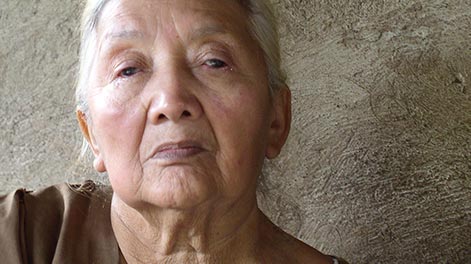 Pitasia Gonzáles lives in rural Mexico with her daughters, in a home surrounded by coffee fields accessible only by foot. Like many of the women in her community, Gonzáles was a strong and capable provider for her family, until river blindness (also known as onchocerciasis) stole her sight many years ago.
Learn more »
Pitasia Gonzáles lives in rural Mexico with her daughters, in a home surrounded by coffee fields accessible only by foot. Like many of the women in her community, Gonzáles was a strong and capable provider for her family, until river blindness (also known as onchocerciasis) stole her sight many years ago.
Learn more »
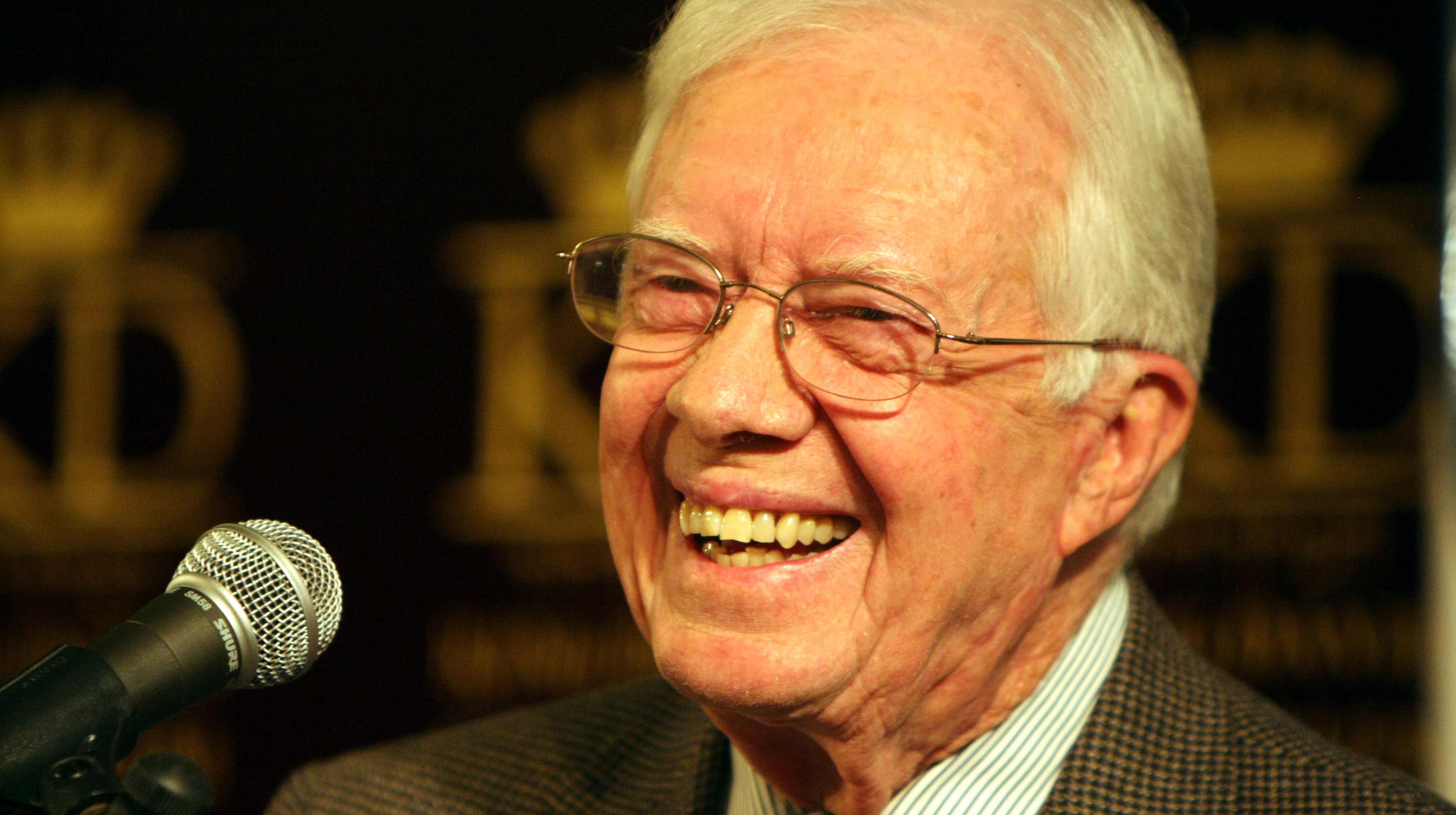 Gazans gather, above, to watch the April 21 Jerusalem press conference of former U.S. President Jimmy Carter. Click here, or on images above, to view video footage of the press conference and the Palestinian observers in Gaza.
Learn more »
Gazans gather, above, to watch the April 21 Jerusalem press conference of former U.S. President Jimmy Carter. Click here, or on images above, to view video footage of the press conference and the Palestinian observers in Gaza.
Learn more »
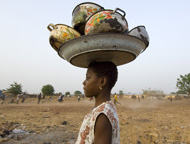 A little more than a year ago, 10-year-old Hubeida Iddirisu faced long days of pain as three Guinea worms began to emerge from blisters on her body. Every day for two weeks, a volunteer came to her home in Savelugu town, Ghana, to extract the worms slowly by rolling them on pieces of gauze, a little each day. As is the case with most Guinea worm disease victims, Iddirisu was unable to handle her household tasks while the worms were emerging. Her family relies on her income from selling charcoal.
Learn more »
A little more than a year ago, 10-year-old Hubeida Iddirisu faced long days of pain as three Guinea worms began to emerge from blisters on her body. Every day for two weeks, a volunteer came to her home in Savelugu town, Ghana, to extract the worms slowly by rolling them on pieces of gauze, a little each day. As is the case with most Guinea worm disease victims, Iddirisu was unable to handle her household tasks while the worms were emerging. Her family relies on her income from selling charcoal.
Learn more »
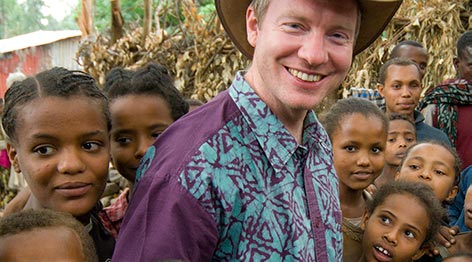 Growing up in England, Dr. Paul Emerson dreamed of becoming a scientist and an educator, the kind of individual who would have both the technical knowledge and practical skills to show people how to better their lives. That dream led him first to teach in England and Africa, then to become a medical entomologist, and now to The Carter Center, which he joined three years ago as director of the Trachoma Control Program. "My specialty is the humble house fly and the diseases it transmits," he said. One of the worst of these is trachoma, a bacterial infection of the eyes.
Learn more »
Growing up in England, Dr. Paul Emerson dreamed of becoming a scientist and an educator, the kind of individual who would have both the technical knowledge and practical skills to show people how to better their lives. That dream led him first to teach in England and Africa, then to become a medical entomologist, and now to The Carter Center, which he joined three years ago as director of the Trachoma Control Program. "My specialty is the humble house fly and the diseases it transmits," he said. One of the worst of these is trachoma, a bacterial infection of the eyes.
Learn more »
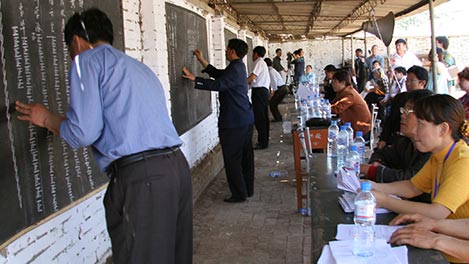 Websites sponsored by The Carter Center have become an important portal for political reform in China, engaging their audiences with news articles translated into both Chinese and English and offering a platform to debate current affairs in a traditionally closed society.
Learn more »
Websites sponsored by The Carter Center have become an important portal for political reform in China, engaging their audiences with news articles translated into both Chinese and English and offering a platform to debate current affairs in a traditionally closed society.
Learn more »
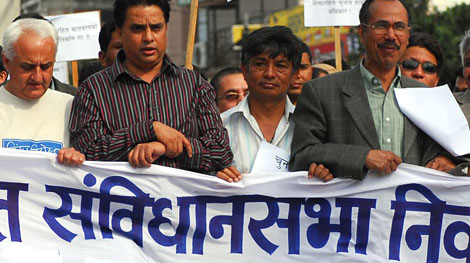 The Carter Center’s international election observation delegation to Nepal’s April 10, 2008, elections, led by former U.S. President Jimmy Carter, former First Lady Rosalynn Carter, and Dr. Surakiart Sathirathai, former deputy prime minister of Thailand, included 62 observers from more than 20 nations.
Learn more »
The Carter Center’s international election observation delegation to Nepal’s April 10, 2008, elections, led by former U.S. President Jimmy Carter, former First Lady Rosalynn Carter, and Dr. Surakiart Sathirathai, former deputy prime minister of Thailand, included 62 observers from more than 20 nations.
Learn more »
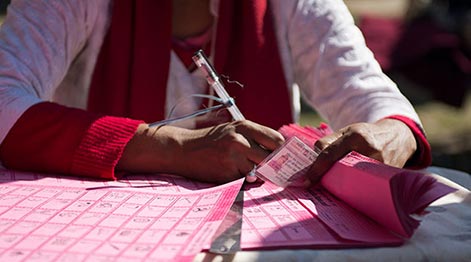 Carter Center election observers witnessed a historic vote in Nepal on April 10 creating a constituent assembly to draft a new constitution for the country that will likely abolish the 240-year-old monarchy.
Learn more »
Carter Center election observers witnessed a historic vote in Nepal on April 10 creating a constituent assembly to draft a new constitution for the country that will likely abolish the 240-year-old monarchy.
Learn more »
The Carter Center and the African Union (AU) signed a Memorandum of Understanding (MOU) on July 29, 2008, at the AU Commission in Addis Ababa, Ethiopia. The MOU will enable the Center to work closely with the AU in areas such as election monitoring, human rights, and strengthening democracies. Learn more »
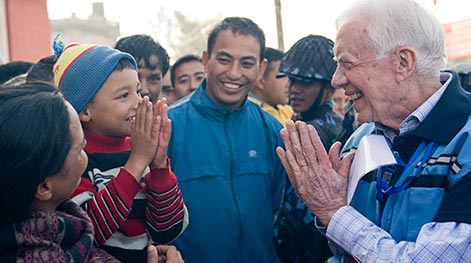 Former U.S. President Jimmy Carter and former First Lady Rosalynn Carter led the Carter Center's international election observation delegation to Nepal's historic constituent assembly elections, co-led by Dr. Surakiart Sathirathai, former deputy prime minister of Thailand.
Learn more »
Former U.S. President Jimmy Carter and former First Lady Rosalynn Carter led the Carter Center's international election observation delegation to Nepal's historic constituent assembly elections, co-led by Dr. Surakiart Sathirathai, former deputy prime minister of Thailand.
Learn more »
The constituent assembly election is a central feature of Nepal’s ongoing peace process and was agreed to by all parties in the Nov. 21, 2006, Comprehensive Peace Accord. The elections will create a representative body charged with drafting a new constitution for Nepal and give the people of Nepal their first opportunity to speak out and express their views on the future direction of the country. Learn more »
The constituent assembly election is a central feature of Nepal's ongoing peace process and was agreed to by all parties in the Nov. 21, 2006, Comprehensive Peace Accord. The elections will create a representative body charged with drafting a new constitution for Nepal and give the people of Nepal their first opportunity to speak out and express their views on the future direction of the country. Learn more »
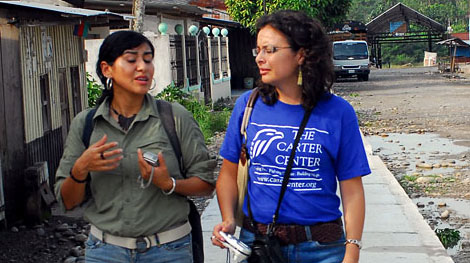 The Carter Center conducted a conflict–related development analysis in two towns along the Ecuador northern border. The analysis focuses on development in the border zone, including access to justice and human rights, citizen security, and youth and social inclusion, and will serve as input for the creation of public policies for development in the northern border zone by Ecuador’s government.
Learn more »
The Carter Center conducted a conflict–related development analysis in two towns along the Ecuador northern border. The analysis focuses on development in the border zone, including access to justice and human rights, citizen security, and youth and social inclusion, and will serve as input for the creation of public policies for development in the northern border zone by Ecuador’s government.
Learn more »
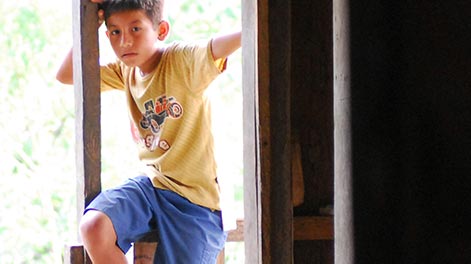 Buenaventura Morales has a kind face worn weary from life, and friendly eyes that hide the depression plaguing him since he fled his native Colombia after massacres to his village in 2004. His wife died along the way, and he said he feels unable to support his four children by himself; he can't find a job in this poor border region of Ecuador. He plans to rent a small plot of land nearby to grow rice and trade it among the large refugee community here. Life on the border between Ecuador and Colombia is tough, and complicated.
Learn more »
Buenaventura Morales has a kind face worn weary from life, and friendly eyes that hide the depression plaguing him since he fled his native Colombia after massacres to his village in 2004. His wife died along the way, and he said he feels unable to support his four children by himself; he can't find a job in this poor border region of Ecuador. He plans to rent a small plot of land nearby to grow rice and trade it among the large refugee community here. Life on the border between Ecuador and Colombia is tough, and complicated.
Learn more »
What struck me most about the country is not how the people have changed: it is how the government has changed because of people. The government seems to be more keenly aware of the people’s needs, of the growing gap between the rich and the poor, of the international pressure on China to change its policies on issues such as environmental pollution, global warming, energy saving, and of its own source of legitimacy. Learn more »
What struck me most about the country is not how the people have changed: it is how the government has changed because of people. The government seems to be more keenly aware of the people's needs, of the growing gap between the rich and the poor, of the international pressure on China to change its policies on issues such as environmental pollution, global warming, energy saving, and of its own source of legitimacy. Learn more »
After launching its malaria program in 2006, The Carter Center moved quickly to supply a shortfall of 3 million LLINs, requested by the Ethiopian Ministry of Health to help reach Ethiopia's goal of 20 million LLINs to cover all households in malarious areas by mid-2007. Learn more »
In this Q&A, the Carter Center's Laura Neuman, assistant director of the Americas Program and Access to Information Project manager, shares her insights. Learn more »
Access to public information matters to the average citizen: it is a human right with the power to make a difference in both individual lives and in the life of a community. Although great advances have been made worldwide over the last decade, countries still face important challenges in the implementation and enforcement of access to information laws. Learn more »
Access to information is a fundamental right. Allowing people to seek and receive public documents serves as a critical tool for fighting corruption, enabling citizens to more fully participate in public life, making governments more efficient, encouraging investment, and helping persons exercise their fundamental human rights. For this reason, The Carter Center is actively involved with governments and civil society. Learn more »
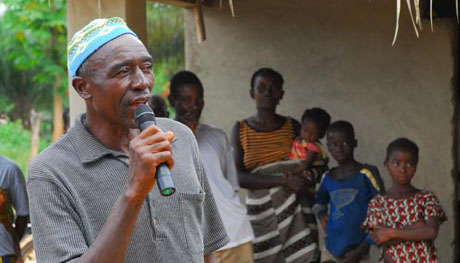 At the invitation of the Government of Liberia, the Carter Center's "Strengthening the Rule of Law and Combating Impunity" project, begun in October 2006, is filling critical gaps in the delivery of justice in rural Liberia.
Learn more »
At the invitation of the Government of Liberia, the Carter Center's "Strengthening the Rule of Law and Combating Impunity" project, begun in October 2006, is filling critical gaps in the delivery of justice in rural Liberia.
Learn more »
"Frankly, I would like to see Liberia at the apex of the continent, on top. I believe very strongly and very sincerely that in spite of what we've been through-the devastation and degradation and all of the other negatives that we can think of-we still have the propensity to rise highly and rigorously." Learn more »
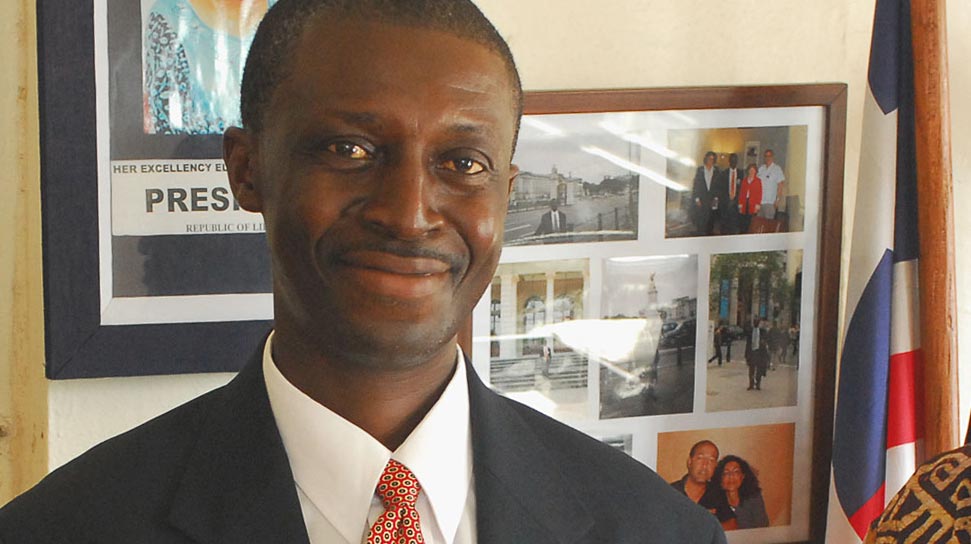 Tiawan S. Gongloe, solicitor general of Liberia, knows his country's justice system from both sides of a jail cell. As a student activist in the late 1970's, he was imprisoned and beaten for speaking out against the government of then-president William Tolbert, and later for speaking out against President Charles Taylor.
Learn more »
Tiawan S. Gongloe, solicitor general of Liberia, knows his country's justice system from both sides of a jail cell. As a student activist in the late 1970's, he was imprisoned and beaten for speaking out against the government of then-president William Tolbert, and later for speaking out against President Charles Taylor.
Learn more »
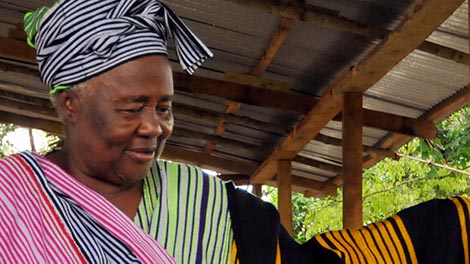 Mama Tumeh, leader of the country-wide Traditional Women for Peace – a Carter Center partner — is regarded as the spiritual leader of women throughout Liberia. Her work is bringing a message of hope and empowerment to women who are survivors of the country's 14-year civil war.
Learn more »
Mama Tumeh, leader of the country-wide Traditional Women for Peace – a Carter Center partner — is regarded as the spiritual leader of women throughout Liberia. Her work is bringing a message of hope and empowerment to women who are survivors of the country's 14-year civil war.
Learn more »
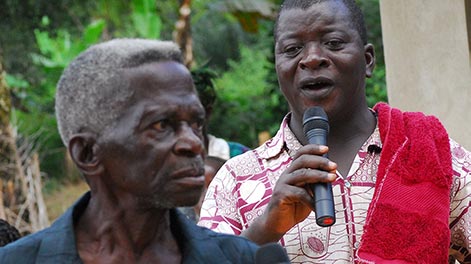 The Modia Drama Club, based in Gbarnga, Liberia, is a Carter Center partner in the rule of law public education and awareness campaign. Members travel to Liberia's most remote villages by foot, motorcycle, and four-wheel drive, to educate entire communities – often gathered in open-air settings – through skits, music, and interactive dialogue on Liberia's new laws.
Learn more »
The Modia Drama Club, based in Gbarnga, Liberia, is a Carter Center partner in the rule of law public education and awareness campaign. Members travel to Liberia's most remote villages by foot, motorcycle, and four-wheel drive, to educate entire communities – often gathered in open-air settings – through skits, music, and interactive dialogue on Liberia's new laws.
Learn more »
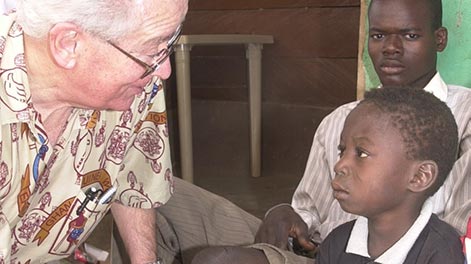 Fifteen years ago, Dr. Ernesto Ruiz-Tiben, then in his early 50s, was contemplating retirement. He had served 27 years as a commissioned officer of the U.S. Public Health Service at the Centers for Disease Control and Prevention, and was thinking about starting a new career and traveling.
Learn more »
Fifteen years ago, Dr. Ernesto Ruiz-Tiben, then in his early 50s, was contemplating retirement. He had served 27 years as a commissioned officer of the U.S. Public Health Service at the Centers for Disease Control and Prevention, and was thinking about starting a new career and traveling.
Learn more »
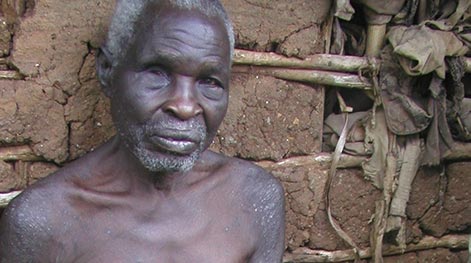 Today, a visitor to the Mbale district of eastern Uganda might see Mustafa Mugwano happily plowing his fields in the lush farming village of Bunawazi. But two years ago, he would have been found living alone in the forests bordering the village. Mugwano survived there for more than 10 years after having been turned away by his community.
Learn more »
Today, a visitor to the Mbale district of eastern Uganda might see Mustafa Mugwano happily plowing his fields in the lush farming village of Bunawazi. But two years ago, he would have been found living alone in the forests bordering the village. Mugwano survived there for more than 10 years after having been turned away by his community.
Learn more »
Please sign up below for important news about the work of The Carter Center and special event invitations.